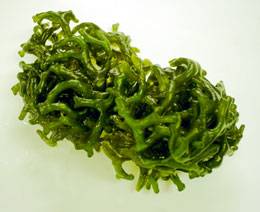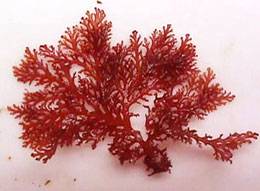
Seaweed is a generic term for all types of marine algae. Most of the seaweeds contain minerals, vitamins, proteins, sulfated polysaccharides, EPA, and low molecular weight sodium alginate. There are more than 2,000 of discovered kinds of seaweed growing near Japan only. There are three most typical of seaweed kinds: brown algae, red algae, and green algae. Brown algae contain kombu (kelp), mozuku, wakame, hijiki, and umitoranoo and others. Red algae contain for example asakusanori (porphyra tenera) and tengusa (gelidium). Green algae include green laver, sea lettuce, and kasanori. Seaweed grows by the power of light and water. It cannot live in the depths where the sunlight does not reach or on the land where there is no seawater. The seaweed growth area is distributed along the coast where light, water and multiple nutrients are in abundance. Seaweed is food for fish, shellfish, and crustaceans that live in the sea. It is also a location where they can find a place to hide or lay eggs. Moreover, it has the function of supplying oxygen and purifying the seawater. Seaweed plays a major role in the marine ecosystem.
On The Nutritional Characteristics of Seaweeds
The nutritional characteristic of most of the seaweeds is characterized by containing mostly carbohydrates, having few lipids, being low in calories, and high in dietary fiber. In addition, they are rich in vitamins, iron, and calcium. Fucoidan is one of the water-soluble dietary fibers found in seaweed. Though dietary fiber refers to a substance that is difficult to digest for human digestive enzymes, chemically there are many carbohydrate polysaccharides, and fucoidan also belongs to this group. Multiple studies proved that fucoidan has anti-tumor effects, normalizes blood pressure, improves liver function, and strengthens the immune system. As for non-fucoidan dietary fibers, alginate is also found in the seaweed. Alginate is combined with sodium in the intestine and is excreted together, and this way it discharges the sodium in the blood as well. This improves hypertension. Also, it serves to boost the function of the large intestine, which is effective for treating constipation. Tengusa and other seaweeds also contain the dietary fiber called agar, which unsurprisingly also has suppression effects on hypertension. As for vitamins contained in the seaweed, these include a variety of vitamins like vitamin C, beta-Carotene, niacin, vitamin B, and vitamin K. As for minerals, seaweeds are rich in calcium and help strength bones and teeth. Potassium is also present and performs the function of discharging sodium from the body. Seaweed also has an iodine component. Iodine is a substance that has been pointed out as having a relationship with the thyroid hormone.
On The Effects of the Seaweeds

By ingestion of seaweed, effects such as the improvement of high blood pressure and constipation can be expected. It is widely known that one of the causes of high blood pressure is taking in too much salt. The alginic acid contained in seaweeds has the property of easily binding with the sodium that is in salt. Since alginic acid combines with sodium in the intestine and tends to be eliminated from the body with the sodium, it suppresses the absorption of salt and thus improves hypertension. The effect of seaweed on constipation is due to the function of the water-soluble dietary fibers contained in the seaweed. In the case of dried seaweed, 30–60% of it is dietary fiber. This prepares an environment in the intestines in which it tends to be easier to have smooth discharges of stool. Also, absorption of vitamins and minerals from the seaweed is increased when it is consumed together with vegetable oil. For people with lifestyle-related diseases, one must be careful with overusing oil, but for people with constipation, it is a good food for bowel movements. When consumed with vegetable iol, the dietary fibers in seaweed become more effective for treating constipation. Also it is well known that seaweed is good for the health of the hair. There are cases where hair shrinks and cases where hair falls out. Taking seaweeds in the form of salads or food supplements can be beneficial for the health of the hair. It is considered especially effective on hair that is thinning or shrinking. Seaweed is rich in iodine, which, along with protein, is considered an important constituent for hair. Also, the alginate in seaweed promotes circulation in the scalp, which supports the health of the hair growing in the scalp. Please have a look at our fucoidan product.

